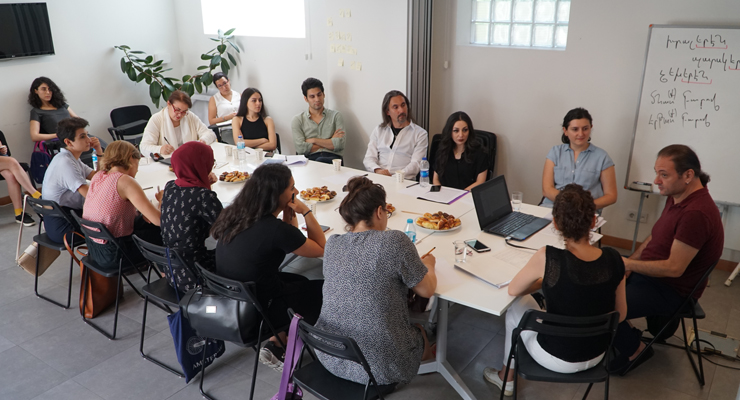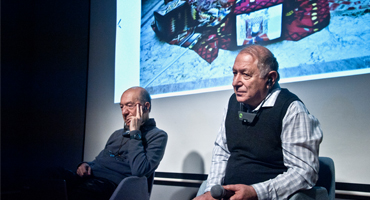Within the scope of the History Program Hrant Dink Foundation, the fifth Social Science Graduate Students Workshop was held on 28 November 2019 at Hrant Dink Foundation, Anarad Hığutyun Building.
These workshops particularly focusing on the Armenian history and culture aim to support the dialogue between researchers by opening master’s and doctoral dissertations up for discussion. In the fifth series of these workshops, three researches, a PhD and two post-graduate dissertations, on the theme of Istanbul and Minorities were discussed. The workshop aims to open discussions on the concepts of city, memory and minority.
First, participants discussed Elif Atalay’s dissertation entitled as “The Minority Groups in İstanbul, Their Perception of Istanbul and Their Urban Memory” completed in the department of ‘Global Cities and Istanbul Studies’ at Marmara University.
In her presentation examining the urban memories and perceptions of Greek, Armenian and Jewish people, Elf Atalay emphasized that collective memory is affected by traumatic events and these traumas are transferred between generations. Atalay problematized the concept of “traumatic memory” and argued that it leads to negative labeling. Based on these findings, in the historical, social, cultural and local memory of the city, the knowledge and experiences of the autobiographical and semantic memories of the Istanbul minorities, and the representation of the perceptions formed by these knowledge and experiences are revealed in a limited and narrow field. On the other hand, she mentioned the risk of marginalization of minority memory in urban memory individually and socially and it leads to commodification of these memories. Organizing ‘Istanbul Pogrom Tours’ or ‘Jewish Heritage in Istanbul’ as touristic events is the most significant example to demonstrate it. Atalay stated that she obtained the basic data of her work from oral history interviews, written and visual resources and literary texts.
Her discussant Asst. Prof Güven Gürkan Öztan mentioned briefly the relationship between collective memory and individual memory within the context of spatial memory. He emphasized that it can be examined within the framework of socio-economic history and social amnesia. Finally, in spatial-consumption context, he underlined ‘objectification of memory’ and explained carefully how memory can become an object as commodity.
Secondly, Emircan Kürküt’s thesis titled “Homogenization and Turkification Practices in Kuzguncuk, Istanbul in the context of the Events of 6-7 September 1955” completed in the Ataturk Institute for Modern Turkish History at Boğaziçi University was discussed.
Kürküt mainly debated demographic changes of Kuzguncuk neighborhood. Despite that Kuzguncuk was mostly settled by non-Muslims in the early 1930’s, the proportion of minorities cannot extend %1 in 2019. Today, it is generally described by the inhabitants as expressions of peace and tolerance. However, the non-Muslim communities living in Kuzguncuk were forced to immigrate Greece and Israel until mid-1950’s. In particular, he mentioned that the pogrom of 6-7 September directly damaged Kuzguncuk non-Muslims. Interestingly, Kuzguncuk’s current community still consider their neighborhood as multi-cultural region with great nostalgia. Kürküt also described the term of ‘Objectification by Nostalgia’ in Kuzguncuk.
His discussant Asst. Prof. Hakan Yücel argued about the methodology of problematization and conceptualization in his master's theses. He emphasized the importance of oral history interviews for social sciences. He advised that the interviews should be used as a full text in the thesis and this could pave the way for other researchers. He also pointed out that the socio-economic impacts of the period should be taken into consideration in the immigration assessments experienced by minority communities.
Thirdly, Özgür Kaymak’s thesis titled "Socio-spatial construction of Greek, Jewish and Armenian communities in Istanbul" completed in the faculty of Political Sciences at Istanbul University was discussed.
Kaymak shared selected chapters from her book that was published from her dissertation and she briefly described them. In her dissertation she addresses the socio-spatial identity construction of Greek, Jew and Armenian community. She carried out interviews with 120 people from Greek, Armenian and Jew communities and her dissertation is mostly based on their accounts. She emphasized the perception of homogeneity in minority-majority contexts. She also talked about the practices of discrimination and exclusion against minorities in the public and private spheres.
Kaymak's thesis is reviewed by Assoc. Dr. Ulaş Sunata. She argued homogeneous perception of minority identities and she added the minority communities should be dealt with different generation, social class and gender variables in social analysis.
Finally, the methodological importance of oral history interviews in social sciences was emphasized. During reviews, it is highlighted that interviews with people should be done in their native language to enable them express emotions and experience openly.




